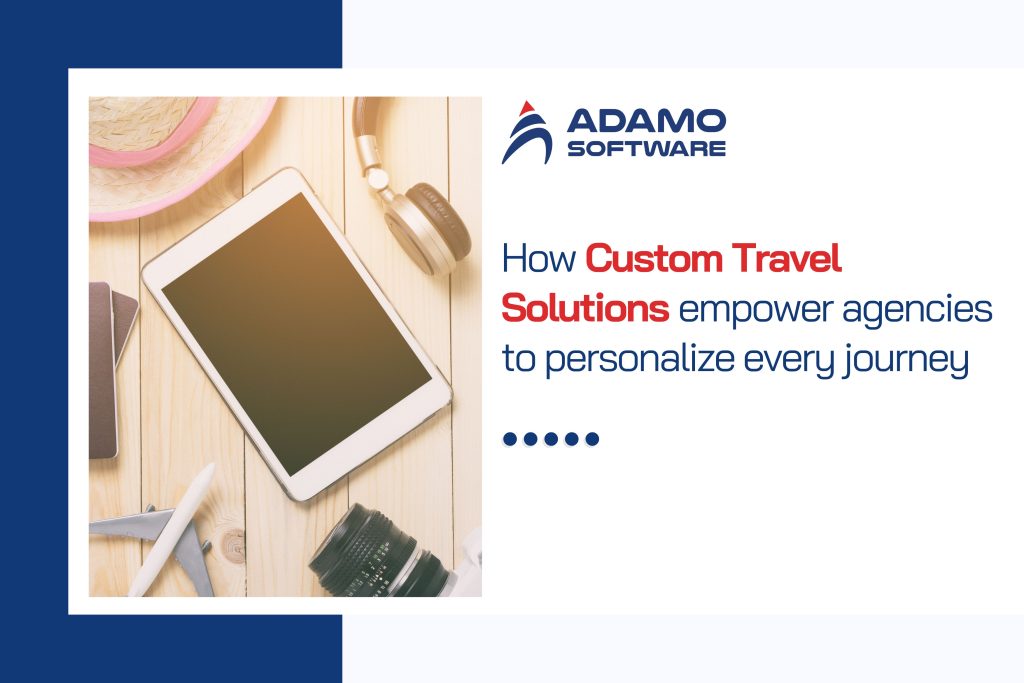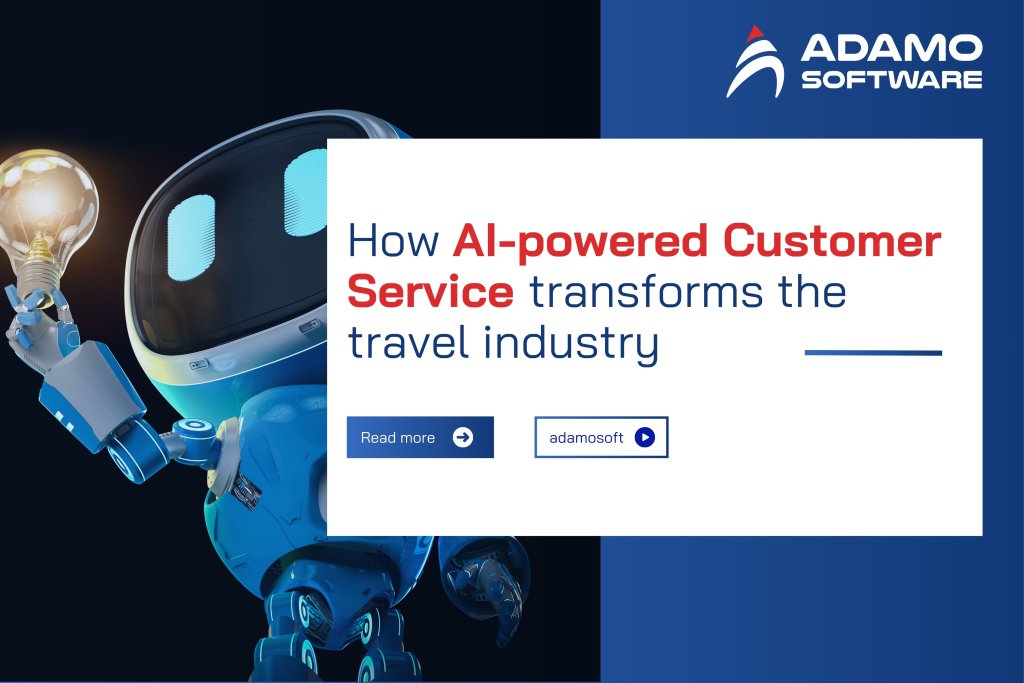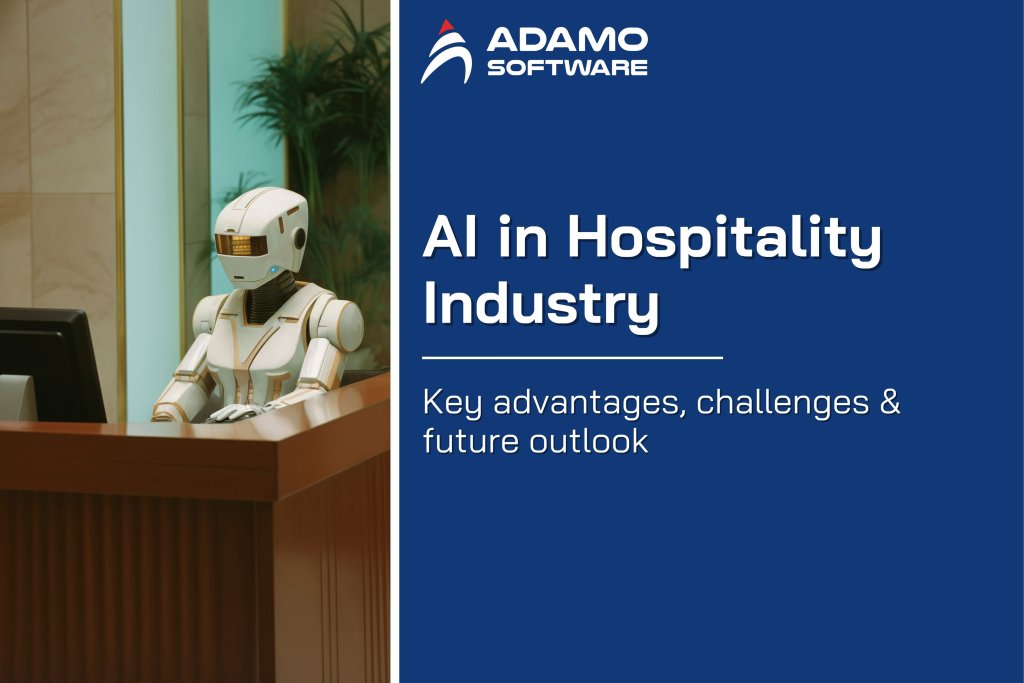How to create hotel management software: From A-to-Z guide
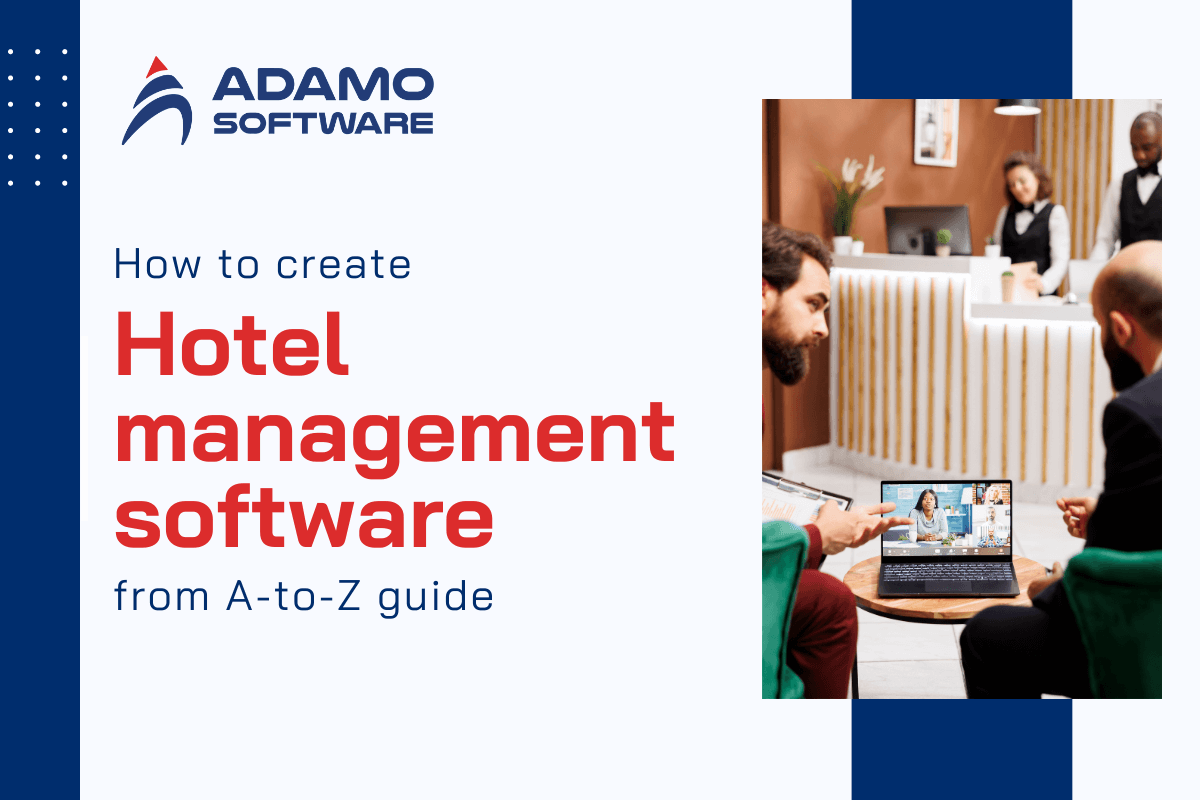
Hotel Management Software can greatly enhance your efficiency and cut expenses. In this blog, we will provide guidance on creating this digital solution.
The hospitality industry is expanding rapidly and showing remarkable progress. Hotels, as a major industry catering to a wide range of people, need streamlined systems to help businesses achieve their goals and improve the overall user experience. Creating custom hotel management software can be a highly effective strategy for staying ahead in a competitive market.
So, let’s dive into creating high-quality custom hotel management software. What are the features you should consider incorporating? What are the benefits of having custom hotel management software? This guide provides comprehensive answers to all of your questions and offers valuable insights into the world of custom hotel management software.
I. What is hotel management software?
Hotel management software is a fantastic tool that empowers hotel owners and managers. It effortlessly streamlines and synchronizes every aspect of their business operations. This software offers a comprehensive feature set that caters to various aspects of hotel management.
In this system, you’ll find a range of essential operations that cover everything from back-office tasks to guest check-in and check-out, reservations, housekeeping, point-of-sale transactions, maintenance, and billing. It’s a comprehensive solution that keeps everything running smoothly.
Furthermore, it elevates the customer experience by implementing customer relationship marketing (CRM) tailored specifically for hotel groups and independent establishments. For example, hotels, motels, resorts, restaurants, bed and breakfasts (B&B), guest houses, serviced apartments, and vacation rental homes.
In addition, it helps streamline inventory management, guest interactions, property management systems, and queue management processes.
II. Hotel management software development: Market stats
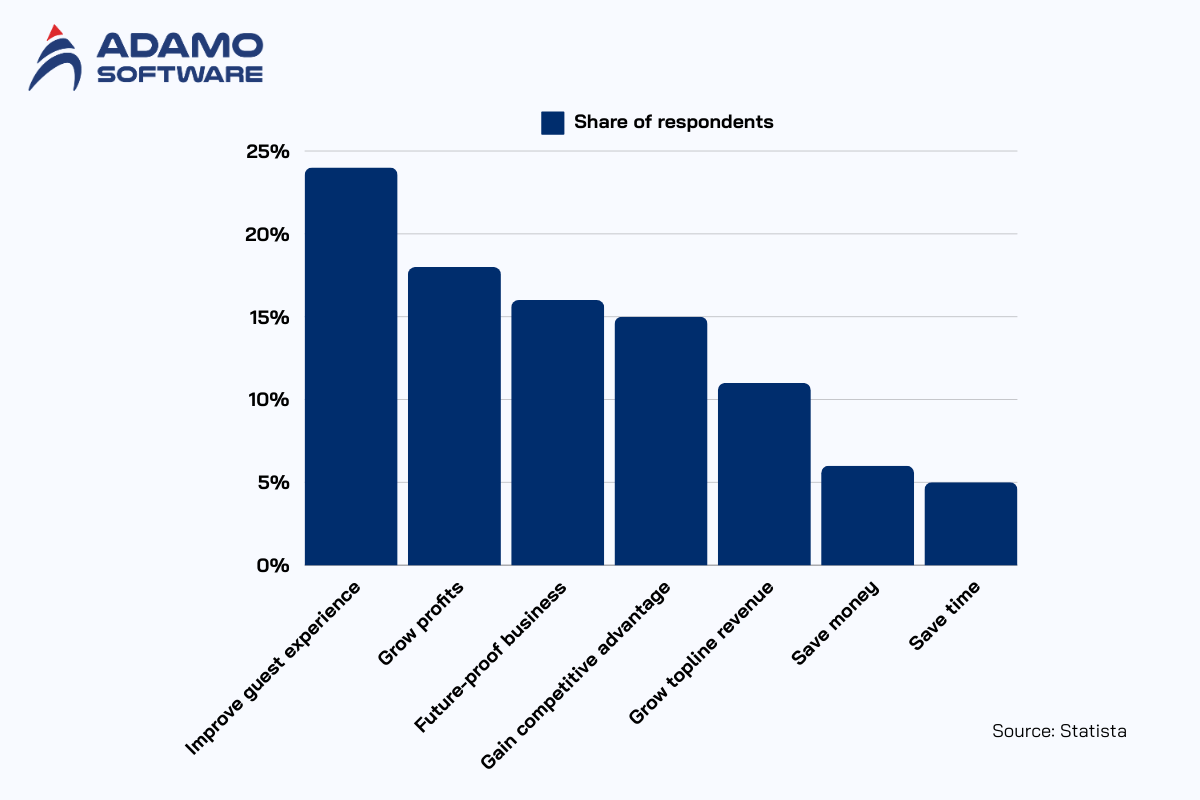
– According to a Statista analysis, the global hospitality marketplace is projected to experience significant growth, with a compound annual boom rate (CAGR) of 22.6%, reaching a staggering $58.1 billion by 2027.
– According to Mordor Intelligence, the hospitality property management software marketplace is projected to reach a value of USD 1.30 billion by 2023.
– In 2023, the international hospitality marketplace was valued at a staggering 4.7 trillion dollars. Experts predicted this figure would soar even higher, reaching an impressive 5.5 trillion dollars in 2024.
– Between 2023 and 2028, the market is expected to experience a steady growth rate of 6.00%. By the end of this period, it is projected to reach a fee of USD 1.833 billion.
– According to Maximize Market Research, the global motel belongings control software market is projected to experience significant growth, with a compound annual growth rate (CAGR) of 10.6%. By 2029, it is expected to reach a market value of USD 12.98 billion, surpassing other reports that suggest a slower growth rate.
– The global market for resort and hospitality management software was valued at USD 3,171.1 million in 2020. It is expected to experience a steady growth rate of approximately 6.7% annually, reaching USD 4,894.4 million by 2028.
III. Top tech trends empowering the hotel industry in 2024
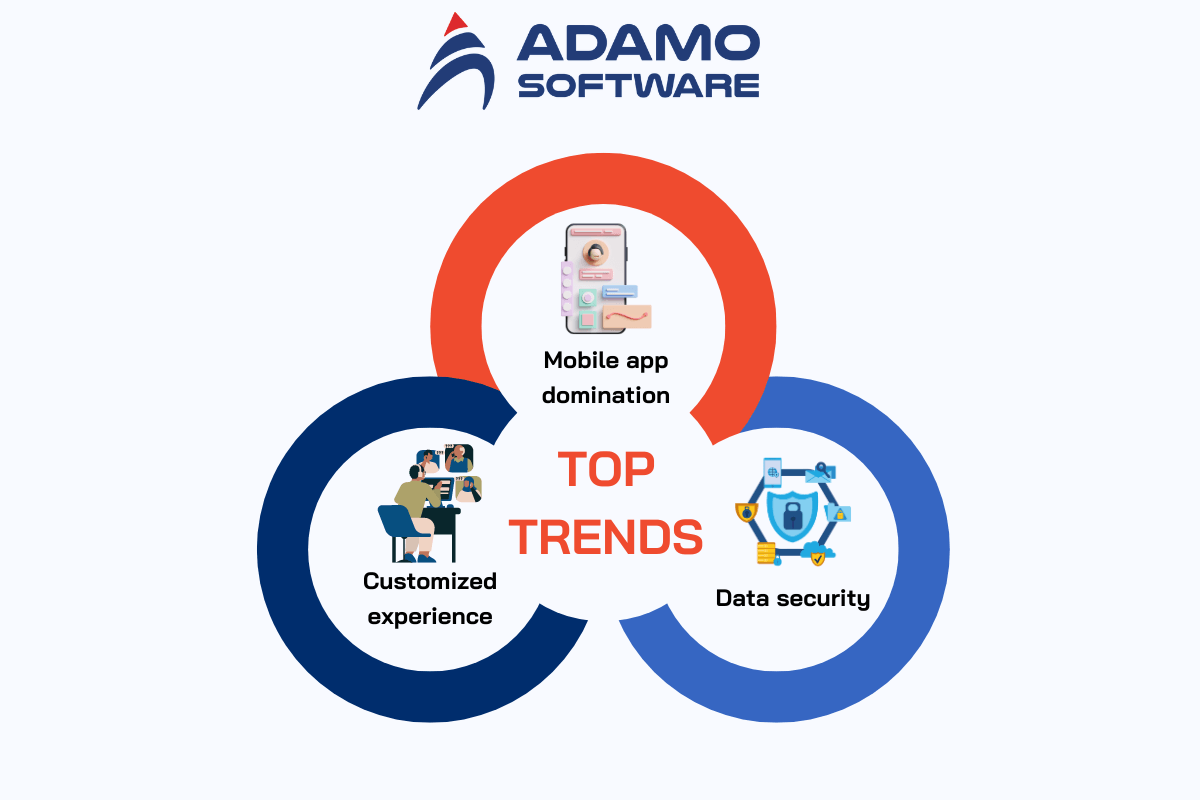
1. Mobile app domination
Gone are the days when people relied on travel agents for making travel arrangements. In today’s fast-paced world, it seems like everything is going mobile. It’s becoming increasingly common for travelers to rely on smartphones for their journeys. According to booking research, a significant number of individuals, around 50%, initiate their travel plans using mobile devices. Mobile hotel apps have become a source of fascination for guests and hoteliers of all generations, as they offer mutual benefits. Here’s how:
– Millennials value the convenience of mobile check-in, avoiding long queues at reception.
– Planning trips for their parents online.
– For business owners, having a mobile app that offers a mobile room key or allows guests to order services to their rooms can make a positive impression on visitors.
– Additionally, employees can benefit from this technology by reducing their routine work.
It’s incredibly convenient to use a smartphone to check and book flight tickets and hotels, plan various activities and find nearby restaurants, hospitals, and banks. It’s no surprise that the hotel software development industry is shifting towards mobile solutions.
2. Customized experience
It’s interesting how personalizing things can make a difference. It seems that people enjoy feeling special. Personalization goes beyond the simple act of having your name written on a coffee cup. It quickly became a popular trend across all software platforms.
Personalizing the experience is all about going the extra mile for your customers. It’s about knowing their names, providing them with relevant content about travel, and sending them warm welcome and farewell emails. These small gestures can make a big difference in creating a personalized and memorable experience.
It’s all about fostering an atmosphere that resembles a casual conversation between friends. Implementing this approach can lead to a boost in customer loyalty and engagement, resulting in a significant increase in revenue.
In addition, hotel employees can personalize their profiles and communicate through chat features within the hotel management software. It will enhance the team’s cohesion and connectivity.
3. Data security
Data has become incredibly valuable for various industries, ranging from healthcare and transportation to telecommunication and food. Even the hospitality industry recognizes the importance of safeguarding this precious resource. Businesses can greatly benefit from this, as it enhances their reputation and fosters trust among customers.
There are several methods that hackers commonly use to gain access to personal information, such as ransomware, phishing, and distributed denial-of-service (DDoS) attacks. Additionally, it’s important to consider the possibility of human error. Data security is of utmost importance for hotel management software, ensuring it can effectively respond to any potential security breaches.
IV. How to create a hotel management system: 5 steps to know
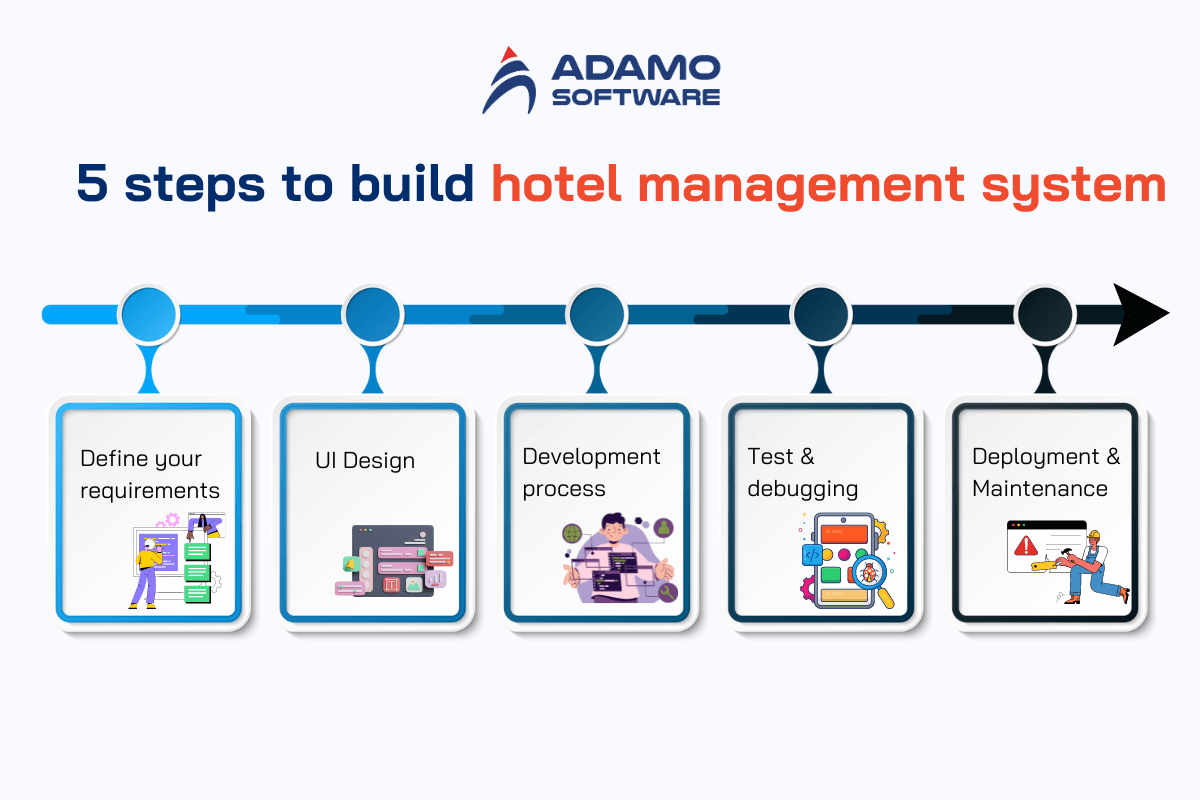
1. Define your requirements
Understanding your hotel’s specific requirements is crucial in developing a software solution that caters to your business needs. This not only helps in cutting down software development expenses but also ensures that the project progresses smoothly. Now, let’s look at these important areas:
– Hotel specifics: This includes determining the type of hotel (such as boutique, resort, or business hotel), its size, target market, and overall positioning.
– Operational Challenges: Discover the areas that may be causing frustration in your current processes, such as tasks that require manual effort, inconsistencies in data, or delays in booking procedures.
– Desired Functionalities: Let’s focus on the key features such as reservations, room management, guest profiles, housekeeping, front desk operations, and reporting.
– Integration Requirements: Identify the necessary systems (PMS, CRM, payment gateways) that need to be integrated for smooth operations.
– Long-term Vision: Detail your hotel’s plans for growth and explain how the software can adapt to facilitate future expansion.
2. UI Design
Now that you have all the requirements and features in place, it’s time to start thinking about creating a user interface that will facilitate feedback collection and drive improvements. During the user interface design phase, you will need to complete the following tasks:
– Visual Design – Create a visually stunning interface that perfectly reflects the hotel’s brand. It’s important to ensure that your colors, aesthetics, and typography all work together harmoniously. These elements are sure to captivate and engage users.
– Wireframing and prototyping – Creating wireframes or low-fidelity mockups allows you to establish the structure and layout of the user interface. Wireframing and prototyping are invaluable tools for gathering feedback and refining your work in the initial phases.
– User-experience design: you have the power to craft a design that is both user-friendly and incredibly engaging.
3. Development process
With a clearly defined software roadmap, the development team is now able to dive into creating the hotel management software solution. During this stage, the team should complete the following tasks:
– Selecting the ideal tech stack: It’s crucial to consider the frameworks and programming languages that will boost and improve the outcome of your projects. When making their decision, they need to consider factors such as how easily the system can be integrated with other systems, the level of security it provides, and its scalability.
– Coding and development: The talented team can now create and implement top-notch code that aligns perfectly with your goals and requirements.
– Modular development: This is an incredibly effective software development strategy that can significantly speed up the development process, reduce costs, and improve the overall quality of the software solution. Thus, the team divides the development processes into smaller and more manageable modules to facilitate development, testing, and deployment.
4. Testing & Debugging
After the system is prepared, the team needs to conduct a series of software tests to make sure that the system is working smoothly and without any glitches. During the testing and debugging phase, the team carries out a series of tasks:
– Functional Testing: Verifying the functionalities of software solutions in relation to the requirements in a real-world environment.
– Unit Testing: Testing individual code modules to ensure their independent functionality.
– Usability Testing: The focus is on testing the software solution’s viability by observing how real users interact with the system.
– Integration Testing: This type of testing is performed to ensure smooth interaction between various software modules.
5. Deployment & Maintenance
Finally, after a thorough round of testing and ensuring flawless functionality, your hotel management software solution is now complete. Here are some tasks you can do:
Deployment – choose the deployment approach that best suits your business requirements. Imagine having a cloud-based solution that allows you to access the software on any device used on the hotel computers. It’s like having your own personal assistant at your fingertips.
Staff training – Teach all employees how to effectively use the software to improve task completion, foster a productive work atmosphere, and prioritize customer satisfaction.
Maintaining Momentum – The software development process is an ongoing journey. As you navigate through your journey, you can expect to encounter some challenges. User preferences may shift, industry trends will come and go, and your competitors will constantly be adapting their strategies. To effectively tackle these challenges, it is crucial to prioritize ongoing maintenance and regular updates of the hotel management software, utilizing the most up-to-date technologies in the industry.
You can explore the overview of channel management software for hotel here.
V. The hidden challenges of hotel software development
If you’re interested in creating hotel management software, it’s important to be aware of the various challenges that come with it. In order to address the potential challenges and ensure that the result meets the diverse needs of the hospitality industry. Here are the top five obstacles that stand in the way:
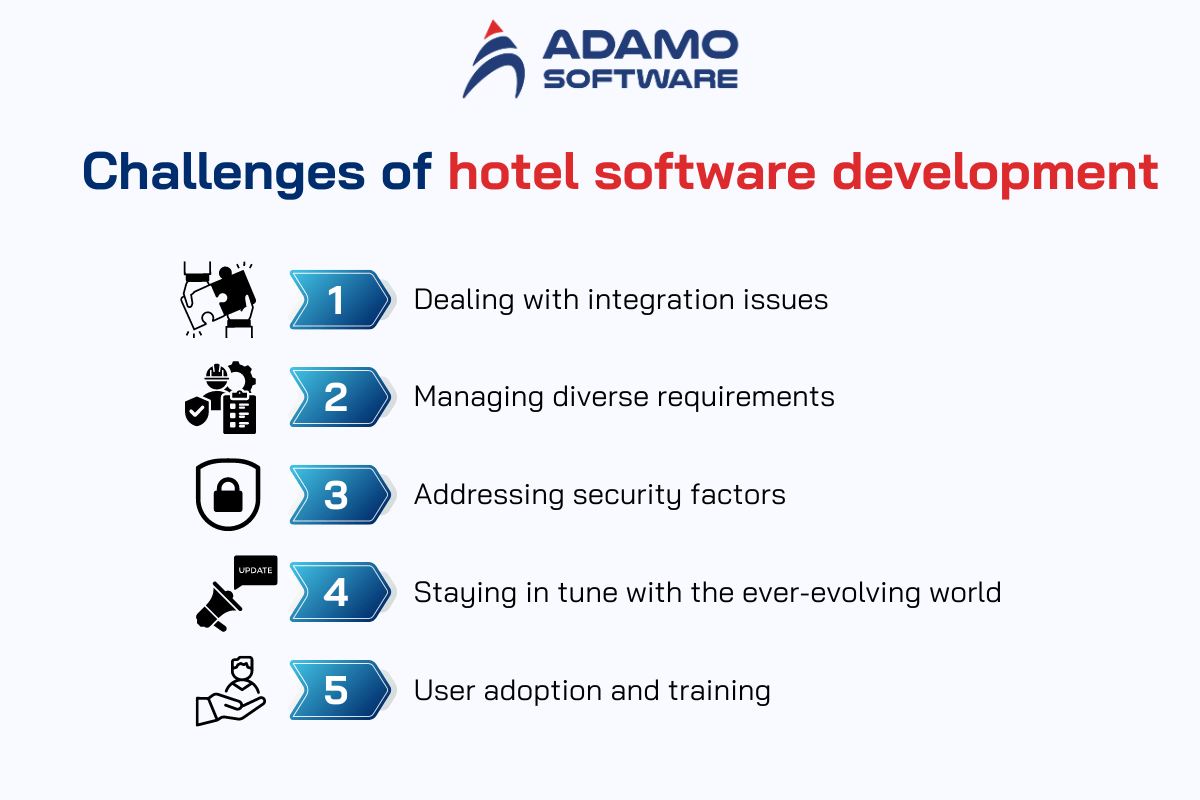
1. Dealing with integration issues
It’s likely that inns already have systems in place for channel management, payments, or accounting. Integrating the brand-new on-demand app development for hotel management with existing tools can be quite a challenge, requiring careful planning.
2. Managing diverse requirements
Hotels come with unique functional requirements and are available in a wide variety of sizes and shapes. Using a one-size-fits-all software management software is not effective. Working closely with stakeholders is crucial for prioritizing functions and understanding specific requirements.
3. Addressing security factors
Ensuring the security of visitor data is of utmost importance when it comes to enterprise product development. To effectively prevent breaches, it is crucial for the hotel management software to adhere to records privacy laws and incorporate strong security features such as encryption and access limits.
4. Staying in tune with the ever-evolving world
The hospitality industry is always evolving. In order to keep up with the ever-changing demands of guests, it is crucial for hotel management software to be adaptable and open to incorporating cutting-edge technologies such as artificial intelligence and mobile solutions.
5. User adoption and training
Without the convenience of a cloud app development company, even the most advanced software loses its effectiveness. By investing in comprehensive training apps and user-friendly interfaces, companies can ensure that their employees can fully maximize the benefits of the software.
VI. Must have tech stack for hotel management software development
According to your requirements, the development teams need to possess sufficient skills and knowledge in the following areas:
When it comes to programming languages, you have a few options to choose from. PHP, Java, and Python are all popular choices, each with their own unique features and capabilities. The best language for your software solution will depend on its specific requirements and complexity.
When it comes to frameworks, there are several options to choose from. For PHP, Laravel is a popular choice. If you’re working with Java, Spring is a reliable framework to consider. And for Python, Django is a widely used framework.
As for databases, the choice depends on the type and volume of data you’re dealing with. MongoDB is a popular option for its flexibility, while PostgreSQL is known for its robustness. And of course, MySQL is a reliable choice that many developers are familiar with.
VII. Build a robust hotel management software with Adamo Software
Discover how the perfect hotel management software can revolutionize your operations, enhance customer service, and boost your bottom line. By implementing the strategies outlined above, you can create software that aligns with your business objectives and aids in reaching your financial goals.
If you have a keen interest in hotel management software, it’s essential to reach out to a reliable team of developers. Look no further than the experienced professionals at Adamo Software. Adamo is a leading travel and hospitality software development company in Vietnam. Our team is here to assist you in identifying your business requirements, creating a tailored software structure, and ensuring a smooth implementation of your hotel management software.
Our team has the experience and skills to provide you with custom software that perfectly aligns with your business requirements, ensuring the success of your hotel business.

FAQs
1. How do I select the appropriate hotel management software for my business?
When selecting the right hotel management software, it is important to account for factors such as cost, customer support, scalability, integration capabilities, and simplicity of use. It is also beneficial to consult with other hotel administrators, request demos, and read reviews. The purpose is to identify a solution that is most suitable for your property’s requirements.
2. How can hotel management software aid in revenue management?
Revenue management can be facilitated by hotel management software, which offers real-time data on market demand, pricing trends, and occupancy rates. Dynamic pricing and yield management tools are the advanced features that allow you to optimize room rates and maximize revenue in response to fluctuating market conditions.
3. What are the advantages of creating hotel management software?
You can experience all the advantages of developing hotel management software by hiring a software developer from us:
– Streamlined Operations: Reservations, housekeeping, and invoicing tasks are automated.
– Enhanced Guest Experience: Improves the test-in/check-out techniques, issuer excellence, and customization.
– Data-Driven Decisions: Provides an evaluation to assist in crafting well-informed decisions.
– Enhanced Profitability: Improves stock management and pricing.
– Competitive Advantage: Offers innovative, efficient strategies to attract a greater number of exceptional visitors.
4. How long does it take to develop hotel management software?
Well, the development process can vary depending on various factors. It’s not a quick task, that’s for sure. Developing hotel management software requires careful planning, coding, testing, and refining to ensure it meets all the requirements. The timeline can range from several months to even a year or more, depending on the complexity of the software and the specific features you want to include. It’s definitely a project that requires time and attention to detail.
The duration of development varies based on the task’s functions, team size, and scope. It could potentially take anywhere from six to eighteen months. This covers the different phases of planning, designing, coding, testing, and deployment.



